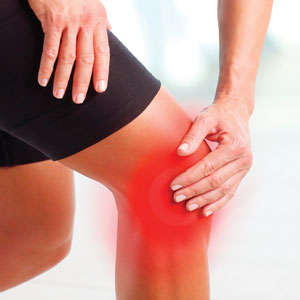
Knee cartilage is a tough, rubbery tissue on the ends of the bones within the knee that allows the joint to bend and move. Over time, this cartilage can wear out or become damaged. As it does, the bones in the knee joint rub together, causing friction that results in inflammation and subsequent knee pain, stiffness and swelling. It can even change the shape of your knee over time.
Those with mild osteoarthritis symptoms may be effectively treated with medication, supplements and/or lifestyle changes. For some, physical therapy might be prescribed, or support braces. For those with more severe symptoms, total knee replacement surgery is often recommended.
For those who do not wish to or cannot have surgery, gel pain injections may be recommended. These can last for up to six months, with results taking effect between 4-5 weeks after treatment.
GAE: A novel approach to treating osteoarthritis of the knee
Genicular artery embolization (GAE) is a minimally invasive procedure to treat osteoarthritis. The procedure reduces the flow of blood to the synovium—the lining of the knee—which in turn reduces inflammation and the associated pain.
Click here to take our quiz and see if you qualify for GAE »
GAE is performed by an interventional radiologist who inserts a tiny catheter into an artery in your upper thigh or wrist and then uses imaging to guide it through the body’s blood vessels to the arteries that supply blood to the synovium, where inflammation occurs. Tiny particles are injected through the catheter into these arteries, which gather in the smaller blood vessels and reduce the flow of blood. The effect is a significant reduction in the inflammation associated with osteoarthritis and a reduction in pain.
A clinical study performed in 2021 demonstrated that the average pain scores decreased from 8 out of 10 to 3 out of 10 within the first week of the procedure.1
GAE FAQs
Osteoarthritis is a degenerative joint disease, characterized by the breakdown of cartilage within a joint. In the knee, when the smooth, protective cartilage breaks down, it can lead to pain and stiffness, as well as decreased mobility of the knee. Osteoarthritis develops slowly over time but will not get better on its own. Mistakenly called a “wear and tear” condition, it is actually a more complex process that leads to changes in the joint tissues and structures, including the development of abnormal blood vessels.
Genicular artery embolization (GAE) is a minimally invasive, image-guided procedure performed by an interventional radiologist, a specialized doctor who performs treatments from inside the body using tiny catheters guided through the vascular system. The abnormal arteries within the knee are embolized (blocked) to prevent the flow of blood through these vessels. This reduces inflammation and the associated pain and stiffness.
The GAE procedure takes about an hour. After the procedure, you will be monitored for about an hour and then you may return home.
Total knee replacement surgery requires general anesthesia and a hospital in which to perform the surgery. The recovery is long and can be painful, requiring many weeks of physical therapy. While total knee replacement surgery is required for those without knee cartilage, those who still have cartilage may qualify for GAE. GAE is an outpatient procedure that requires just a small nick in the skin to access the blood stream. There is no cutting, no scarring, and a much lower risk compared with surgery.
The risk of complications is very low with GAE, and may include mild, temporary pain or discomfort at the catheter insertion site, as well as mild soreness around the knee.
Clinical studies have shown high success rates for GAE at reducing pain and improving mobility. A clinical study performed in 2021 demonstrated that the average pain scores decreased from 8 out of 10 to 3 out of 10 within the first week of the procedure.1
While individual results vary, pain relief can last up to two years or longer, and the GAE procedure may be repeated as necessary.
Coverage varies by insurance provider and individual insurance plan, so it’s important to check with your provider. In most cases, insurance and Medicare does cover the procedure.
If knee osteoarthritis is keeping you from living your best life, visit our contact page or call us at 947-228-5500 to schedule a consultation. We’ll work with all members of your care team to find the treatment that is right for you.
- Non-surgical treatment quickly reduces arthritis knee pain and improves function. Society of Interventional Radiology – SIR 2021 knee pain. (2021, March 16). Retrieved February 17, 2023, from https://www.sirweb.org/media-and-pubs/media/news-release-archive/sir-2021-knee-pain-031621/
